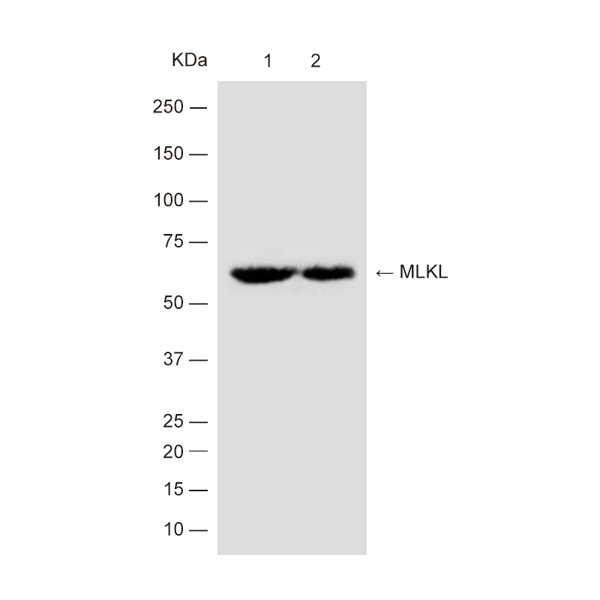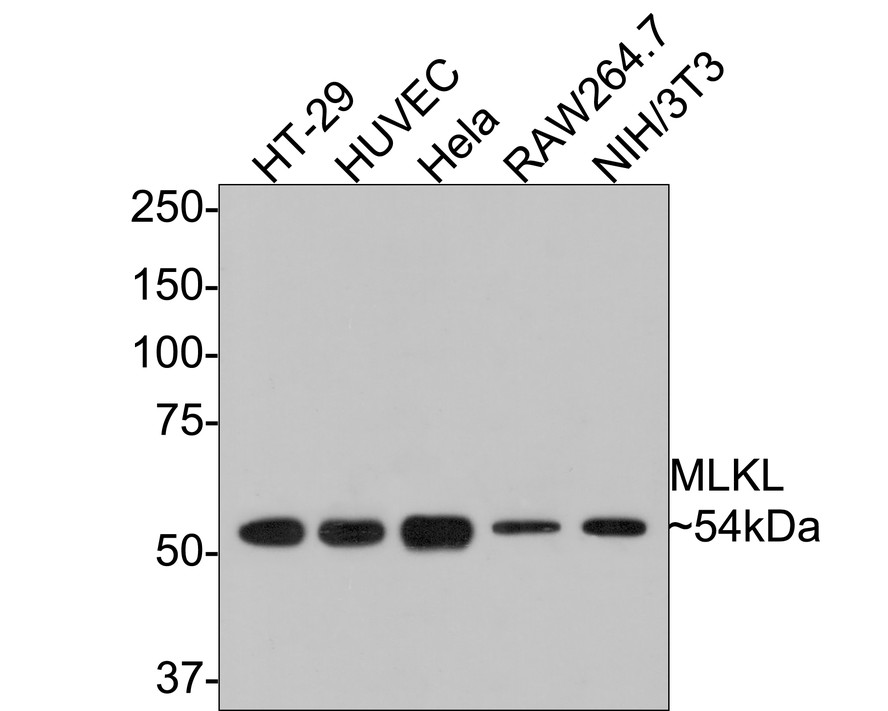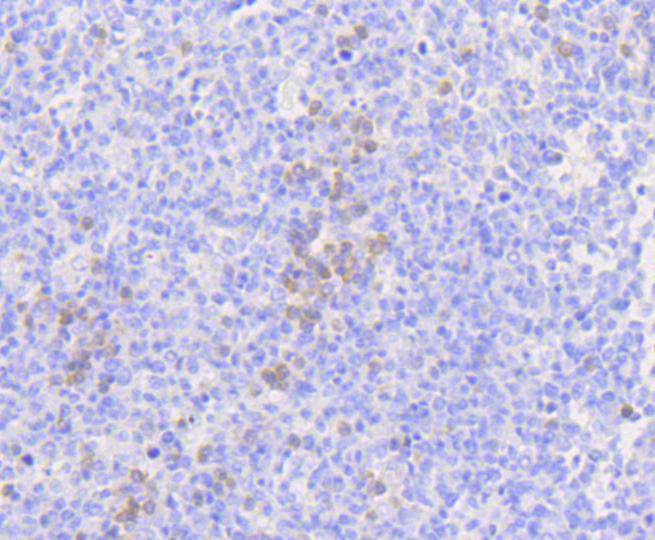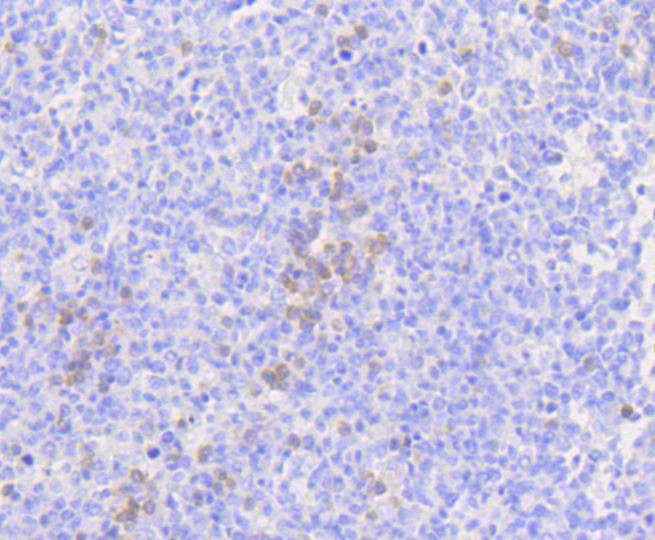
Rabbit Anti-MLKL antibody
hMLKL; Mixed lineage kinase domain like; Mixed lineage kinase domain like protein; Mixed lineage kinase domain-like protein; mixed lineage kinase domain like pseudokinase; MLKL_HUMAN.
View History [Clear]
Details
Product Name MLKL Chinese Name 混合系列蛋白激酶样结构域Recombinant rabbit monoclonal anti Alias hMLKL; Mixed lineage kinase domain like; Mixed lineage kinase domain like protein; Mixed lineage kinase domain-like protein; mixed lineage kinase domain like pseudokinase; MLKL_HUMAN. literatures Research Area Cell biology Kinases and Phosphatases Immunogen Species Rabbit Clonality Monoclonal Clone NO. 3G4 React Species (predicted: Human, Mouse, ) Applications WB=1:1000 IHC-P=1:100-500 (Paraffin sections need antigen repair)
not yet tested in other applications.
optimal dilutions/concentrations should be determined by the end user.Theoretical molecular weight 54kDa Cellular localization cytoplasmic The cell membrane Form Liquid Concentration 1mg/ml immunogen Recombinant Human MLKL protein: 350-471/471 Lsotype IgG Purification affinity purified by Protein A Buffer Solution 0.01M TBS(pH7.4) with 1% BSA, 0.03% Proclin300 and 50% Glycerol. Storage Shipped at 4℃. Store at -20 °C for one year. Avoid repeated freeze/thaw cycles. Attention This product as supplied is intended for research use only, not for use in human, therapeutic or diagnostic applications. PubMed PubMed Product Detail This gene belongs to the protein kinase superfamily. The encoded protein contains a protein kinase-like domain; however, is thought to be inactive because it lacks several residues required for activity. This protein plays a critical role in tumor necrosis factor (TNF)-induced necroptosis, a programmed cell death process, via interaction with receptor-interacting protein 3 (RIP3), which is a key signaling molecule in necroptosis pathway. Inhibitor studies and knockdown of this gene inhibited TNF-induced necrosis. High levels of this protein and RIP3 are associated with inflammatory bowel disease in children. Alternatively spliced transcript variants have been described for this gene. [provided by RefSeq, Sep 2015].
SWISS:
Q8NB16
Gene ID:
197259
Database links:Entrez Gene: 197259 Human
Entrez Gene: 74568 Mouse
Omim: 615153 Human
SwissProt: Q8NB16 Human
SwissProt: Q9D2Y4 Mouse
Unigene: 119878 Human
Unigene: 207971 Mouse
Unigene: 105677 Rat
Product Picture
Primary Ab dilution: 1:1000
Primary Ab incubation condition: 2 hours at room temperature
Secondary Ab: Goat Anti-Rabbit IgG H&L (HRP)
Lysate: 1: U251MG; 2: HeLa
Protein loading quantity: 20 μg
Predicted MW: 55 kDa
Observed MW: 55 kDa
Western blot analysis of MLKL on different lysates with Rabbit anti-MLKL antibody (SLM-52256R) at 1/1,000 dilution.
Lane 1: HT-29 cell lysate
Lane 2: HUVEC cell lysate
Lane 3: Hela cell lysate
Lane 4: RAW264.7 cell lysate Lane 5: NIH/3T3 cell lysate
Lysates/proteins at 10 µg/Lane.
Predicted band size: 54 kDa
Observed band size: 54 kDa
Exposure time: 2 minutes;
8% SDS-PAGE gel.
Proteins were transferred to a PVDF membrane and blocked with 5% NFDM/TBST for 1 hour at room temperature. The primary antibody (SLM-52256R) at 1/1,000 dilution was used in 5% NFDM/TBST at room temperature for 2 hours. Goat Anti-Rabbit IgG - HRP Secondary Antibody at 1:300,000 dilution was used for 1 hour at room temperature.Immunohistochemical analysis of paraffin-embedded human tonsil tissue using anti-MLKL antibody. The section was pre-treated using heat mediated antigen retrieval with Tris-EDTA buffer (pH 9.0) for 20 minutes.The tissues were blocked in 1% BSA for 30 minutes at room temperature, washed with ddH2O and PBS, and then probed with the primary antibody (SLM-52256R, 1/50) for 30 minutes at room temperature. The detection was performed using an HRP conjugated compact polymer system. DAB was used as the chromogen. Tissues were counterstained with hematoxylin and mounted with DPX.Immunohistochemical analysis of paraffin-embedded human tonsil tissue using anti-MLKL antibody. The section was pre-treated using heat mediated antigen retrieval with Tris-EDTA buffer (pH 9.0) for 20 minutes.The tissues were blocked in 1% BSA for 30 minutes at room temperature, washed with ddH2O and PBS, and then probed with the primary antibody (SLM-52256R, 1/50) for 30 minutes at room temperature. The detection was performed using an HRP conjugated compact polymer system. DAB was used as the chromogen. Tissues were counterstained with hematoxylin and mounted with DPX.
References (0)
No References
Bought notes(bought amounts latest0)
No one bought this product
User Comment(Total0User Comment Num)
- No comment






 +86 571 56623320
+86 571 56623320
 +86 18668110335
+86 18668110335

